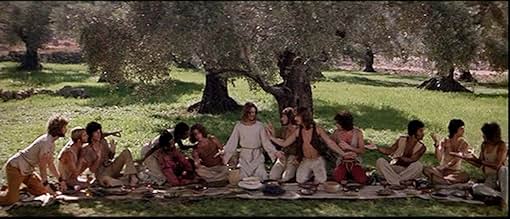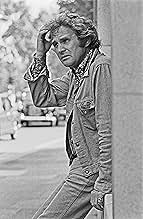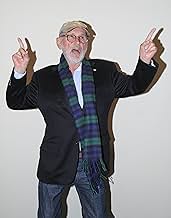PUNTUACIÓN EN IMDb
7,3/10
32 mil
TU PUNTUACIÓN
Versión cinematográfica del musical, que presenta las últimas semanas de la vida de Cristo contadas de forma anacrónica.Versión cinematográfica del musical, que presenta las últimas semanas de la vida de Cristo contadas de forma anacrónica.Versión cinematográfica del musical, que presenta las últimas semanas de la vida de Cristo contadas de forma anacrónica.
- Dirección
- Guión
- Reparto principal
- Nominado para 1 premio Óscar
- 3 premios y 13 nominaciones en total
Larry Marshall
- Simon Zealotes
- (as Larry T. Marshall)
Josh Mostel
- King Herod
- (as Joshua Mostel)
Kurt Yahjian
- Annas
- (as Kurt Yaghjian)
Paul Thomas
- Peter
- (as Philip Toubus)
Jeff Hyslop
- Apostle
- (as Jeffrey Hyslop)
Reseñas destacadas
Jesus Christ Superstar was an excellent movie and an excellent play. I first heard the soundtrack and then saw the movie, and the movie definitely fills in all of the blanks. I was confused in the beginning, when they all rode up in a bus, but I later caught on. Other than that the movie was great, the voices were great, (especially Judas, he really added anger and sorrow to his part) and the setting was perfect. I found it humorous when there were the anachronisms such as grenades and guns at the market. This was a great movie and I will watch it again and again. I am normally skeptical of musicals but I will always hold this close to my heart. This movie should be seen by anyone, and everyone. Peace!
The Lloyd-Webber and Rice musical comes to the screen, and is nothing like the stage show at all. The deserts are real, although the back story is that this is a theatre company, putting on a production in real locations.
The cast are largely session singers and unknowns - Ted Neeley, delicate and high-voiced as Jesus (particularly superb in `Gethsemane'); Carl Anderson, black and doe-eyed as Judas with hot soul vocals, Barry Dennen as Pilate, and Yvonne Elliman as Magdelene with her big number `I Don't Know How To Love Him'.
One loss for those who know the stage version is being removed from the crucifixion preamble, when the ghost of Judas sings `Superstar' - this was all video camera projection in the theatre, while in the movie we are detached observers. But at other times we get uncomfortably close. And the songs survive the transportation to a more realistic setting (except the added `Could We Start Again, Please?' which sounds rather too much like the Coca-Cola theme for comfort).
Best scenes? The one in the temple; Hosanna; and the Pharisees tapping on their scaffolding perches like crows.
The cast are largely session singers and unknowns - Ted Neeley, delicate and high-voiced as Jesus (particularly superb in `Gethsemane'); Carl Anderson, black and doe-eyed as Judas with hot soul vocals, Barry Dennen as Pilate, and Yvonne Elliman as Magdelene with her big number `I Don't Know How To Love Him'.
One loss for those who know the stage version is being removed from the crucifixion preamble, when the ghost of Judas sings `Superstar' - this was all video camera projection in the theatre, while in the movie we are detached observers. But at other times we get uncomfortably close. And the songs survive the transportation to a more realistic setting (except the added `Could We Start Again, Please?' which sounds rather too much like the Coca-Cola theme for comfort).
Best scenes? The one in the temple; Hosanna; and the Pharisees tapping on their scaffolding perches like crows.
I've heard much criticism of this film over many years, and the most annoying criticism is that it didn't have the vitality of the stage productions back "in the day". There isn't much many of us can do about that, though I did see a road production of it about 7 or 8 years ago.
The most interesting thing about this film is that it was set in "modern" times, rather than in biblical times. Roman soldiers wearing shiny helmets, and carrying machine guns is a real attention grabber. The ruins used in the film added another fascinating aspect to the production. In short, the anachronistic approach in the visuals, the lyrics, and the music itself make this a genuinely unique, and clever film.
I thought all the acting, singing, and dancing was great, and still appears to be rather fresh and modern. The lyrics were the most memorable of any movie I've ever seen. There were many of us that could quickly memorize the entire opera from listening to the soundtrack (no videos back then), and have much fun "play acting" ourselves.
The use of Judas as a primary character was probably the single most important aspect of the film. One has to wonder how Judas became one of the inner circle of disciples if he was such an evil crud to begin with. In church he is simply mentioned as being a traitor. The film/musical asks us to think more on this individual, and speculate as to his true nature as a human being. The only other person I know of that attempted to do this was Taylor Caldwell in her novel "I Judas". The point that the crucifixion/resurrection hinged on the betrayal of Judas, should make any Christian wonder if God actually worked through him, and that he wasn't actually "damned for all time."
People seem to be offended by the light-hearted (and hysterically funny!) "King Herod's Song." What does the Bible say about this meeting? Certainly it doesn't say that this was an amicable meeting, and indeed, I seem to remember Jesus being beaten on the palace grounds. The look on Neely's face throughout the Herod song-and-dance is one of seriousness that belies the true nature of what was going on in this scene. This served to remind the viewer that this wasn't sheer levity, and held the scene together in its proper context until it ran full circle with Herod "spazzing" and showing rabid, rather than merely sarcastic hatred for Christ at the end. This was sheer genius and master film craft in my book. I don't think Jesus' expression would come out as well in the stage version. The reservations Pilate had about authorizing the crucifixion seem to come out in the Bible as well. So-called Christians hold Pilate responsible, though there was probably many political things going on that are only vaguely alluded to in the Bible. Non-biblical tradition says that he and his wife, Claudia Procula, eventually converted to Christianity themselves. Who knows?
My least-favorite parts: "I Don't Know How to Love Him" reminds me a lot of "As Long as He Needs Me" in Oliver!. Both songs are plodding, and brings each film to a screeching halt. I believe that this was actually intended to be a pop song, but was thrown in when Webber and Rice were composing the opera. Still, Judas singing this through his tears towards the end of the film was very chilling. "Hosanna, Hosanna" I also find to be rather trite...still...the last stanza never fails to give me goose bumps when the crowd asks if Christ will die for them. Simon Zealot's prolonged screaming (and off key/beat) never fails to annoy me...then again, he was a rebellious zealot after all. The "falling down push up" move in this dance sequence bugs me, too. Another part that bothers me is that suddenly it was Pilate's dream, rather than his wife's as stated in the bible. I guess they did this to narrow the canvas (simplify the number of key characters). But, what a beautiful song! And, I thought the fact that nobody in the cast looked to be much over 25 was kind of weird.
My favorite parts: Caiphas' baritone and Annas' falsetto counterpoint. "Too Much Heaven on Their Minds." The guy with the froggy voice heckling Christ as he's shuffled between Herod and Pilate. The gorgeous girl in the purple shirt (dancer in the Zealot scene)...WHO IS SHE????? Any scene with Judas in it. The montage of crucifixion scenes. The great guitar (all the instrumentation for that matter), and something I wish they had MUCH more of in the movie, that incredible electric piano. I would buy just the instrumental track if it was available.
The most interesting thing about this film is that it was set in "modern" times, rather than in biblical times. Roman soldiers wearing shiny helmets, and carrying machine guns is a real attention grabber. The ruins used in the film added another fascinating aspect to the production. In short, the anachronistic approach in the visuals, the lyrics, and the music itself make this a genuinely unique, and clever film.
I thought all the acting, singing, and dancing was great, and still appears to be rather fresh and modern. The lyrics were the most memorable of any movie I've ever seen. There were many of us that could quickly memorize the entire opera from listening to the soundtrack (no videos back then), and have much fun "play acting" ourselves.
The use of Judas as a primary character was probably the single most important aspect of the film. One has to wonder how Judas became one of the inner circle of disciples if he was such an evil crud to begin with. In church he is simply mentioned as being a traitor. The film/musical asks us to think more on this individual, and speculate as to his true nature as a human being. The only other person I know of that attempted to do this was Taylor Caldwell in her novel "I Judas". The point that the crucifixion/resurrection hinged on the betrayal of Judas, should make any Christian wonder if God actually worked through him, and that he wasn't actually "damned for all time."
People seem to be offended by the light-hearted (and hysterically funny!) "King Herod's Song." What does the Bible say about this meeting? Certainly it doesn't say that this was an amicable meeting, and indeed, I seem to remember Jesus being beaten on the palace grounds. The look on Neely's face throughout the Herod song-and-dance is one of seriousness that belies the true nature of what was going on in this scene. This served to remind the viewer that this wasn't sheer levity, and held the scene together in its proper context until it ran full circle with Herod "spazzing" and showing rabid, rather than merely sarcastic hatred for Christ at the end. This was sheer genius and master film craft in my book. I don't think Jesus' expression would come out as well in the stage version. The reservations Pilate had about authorizing the crucifixion seem to come out in the Bible as well. So-called Christians hold Pilate responsible, though there was probably many political things going on that are only vaguely alluded to in the Bible. Non-biblical tradition says that he and his wife, Claudia Procula, eventually converted to Christianity themselves. Who knows?
My least-favorite parts: "I Don't Know How to Love Him" reminds me a lot of "As Long as He Needs Me" in Oliver!. Both songs are plodding, and brings each film to a screeching halt. I believe that this was actually intended to be a pop song, but was thrown in when Webber and Rice were composing the opera. Still, Judas singing this through his tears towards the end of the film was very chilling. "Hosanna, Hosanna" I also find to be rather trite...still...the last stanza never fails to give me goose bumps when the crowd asks if Christ will die for them. Simon Zealot's prolonged screaming (and off key/beat) never fails to annoy me...then again, he was a rebellious zealot after all. The "falling down push up" move in this dance sequence bugs me, too. Another part that bothers me is that suddenly it was Pilate's dream, rather than his wife's as stated in the bible. I guess they did this to narrow the canvas (simplify the number of key characters). But, what a beautiful song! And, I thought the fact that nobody in the cast looked to be much over 25 was kind of weird.
My favorite parts: Caiphas' baritone and Annas' falsetto counterpoint. "Too Much Heaven on Their Minds." The guy with the froggy voice heckling Christ as he's shuffled between Herod and Pilate. The gorgeous girl in the purple shirt (dancer in the Zealot scene)...WHO IS SHE????? Any scene with Judas in it. The montage of crucifixion scenes. The great guitar (all the instrumentation for that matter), and something I wish they had MUCH more of in the movie, that incredible electric piano. I would buy just the instrumental track if it was available.
10Seanerz
Speaking for the younger generation, I've never seen anything like it. This movie hit theaters 6 years before I was born and I only just saw it now in Nov. 2004. and I was so moved that I had to comment. Visually it was psychedelic, and the editing matches the music masterfully.
The music rocks! Carl Anderson is beyond amazing as Judas, and ALL of the performances are really magnetic. I love singing along with Annas, Jesus, and Kiafass. I mostly listen to KoRn and Rap, so I never expected to remember (rock opera) lyrics and run around performing them. The feeling I got when 1st "experiencing" the movie was trippy. Similar to a live concert. The movie is outstanding and in my opinion will last for generations and generations. It speaks to a part of my soul and spirit.It says "right on" "rock on"
The music rocks! Carl Anderson is beyond amazing as Judas, and ALL of the performances are really magnetic. I love singing along with Annas, Jesus, and Kiafass. I mostly listen to KoRn and Rap, so I never expected to remember (rock opera) lyrics and run around performing them. The feeling I got when 1st "experiencing" the movie was trippy. Similar to a live concert. The movie is outstanding and in my opinion will last for generations and generations. It speaks to a part of my soul and spirit.It says "right on" "rock on"
Although I have been aware of this musical, seemingly forever, I just very recently saw the whole movie on dvd. Unfortunately, while I was acquainted with many of the songs before, I had never really seen it in its entirety before, and I'm not sure why. Also, I've never seen it as a live stage show, be it on Broadway, in London or down the street at the local high school ...
So, then, I can only rate it as a singular movie experience, not comparing it with the Broadway or London stagings. Also, being Jewish and never really studying the life and crucifixion of Jesus, I don't have any strong or pre-conceived spiritual ties to the story.
For me, then, this is a cleverly written and very well-performed musical, that mixes irreverence, time juxtapositions and genuine emotions of sadness and wistfulness. I'm not sure that the movie enhances the great musical; in other words, now that I've seen the movie, I regularly listen to the cd of the musical, and enjoy both about equally. For me, Carl Anderson, as Judas, is the standout, but Ted Neeley does bring an angelic quality to the title character. all of the other supporting roles, including Yvonne Elliman, are done well.
I rate it 8/10 for its excellent music, good staging and for what seems like a faithful film-ization of the original..worth watching for sure!
So, then, I can only rate it as a singular movie experience, not comparing it with the Broadway or London stagings. Also, being Jewish and never really studying the life and crucifixion of Jesus, I don't have any strong or pre-conceived spiritual ties to the story.
For me, then, this is a cleverly written and very well-performed musical, that mixes irreverence, time juxtapositions and genuine emotions of sadness and wistfulness. I'm not sure that the movie enhances the great musical; in other words, now that I've seen the movie, I regularly listen to the cd of the musical, and enjoy both about equally. For me, Carl Anderson, as Judas, is the standout, but Ted Neeley does bring an angelic quality to the title character. all of the other supporting roles, including Yvonne Elliman, are done well.
I rate it 8/10 for its excellent music, good staging and for what seems like a faithful film-ization of the original..worth watching for sure!
¿Sabías que...?
- CuriosidadesNorman Jewison managed only two takes of "The Temple" before he ran out of unbroken props, due to Ted Neeley's unrestrained energy when Jesus smashes everything.
- PifiasDifferences from the source material are not to be counted as goofs. Historical inaccuracies, such as tanks and guns in the year 0033, are also not counted as goofs, especially when related to artistic decisions.
- ConexionesFeatured in Directores de cine: The Films of Norman Jewison (1999)
Selecciones populares
Inicia sesión para calificar y añadir a tu lista para recibir recomendaciones personalizadas
Detalles
- Fecha de lanzamiento
- País de origen
- Idioma
- Títulos en diferentes países
- Jesus Christ Superstar
- Localizaciones del rodaje
- Dead Sea, Israel(King Herod's Song)
- Empresa productora
- Ver más compañías en los créditos en IMDbPro
Taquilla
- Recaudación en todo el mundo
- 101.975 US$
- Duración1 hora 46 minutos
- Color
- Relación de aspecto
- 2.39 : 1
Contribuir a esta página
Sugerir un cambio o añadir el contenido que falta

Principal laguna de datos
By what name was Jesucristo Superstar (1973) officially released in India in English?
Responde




























